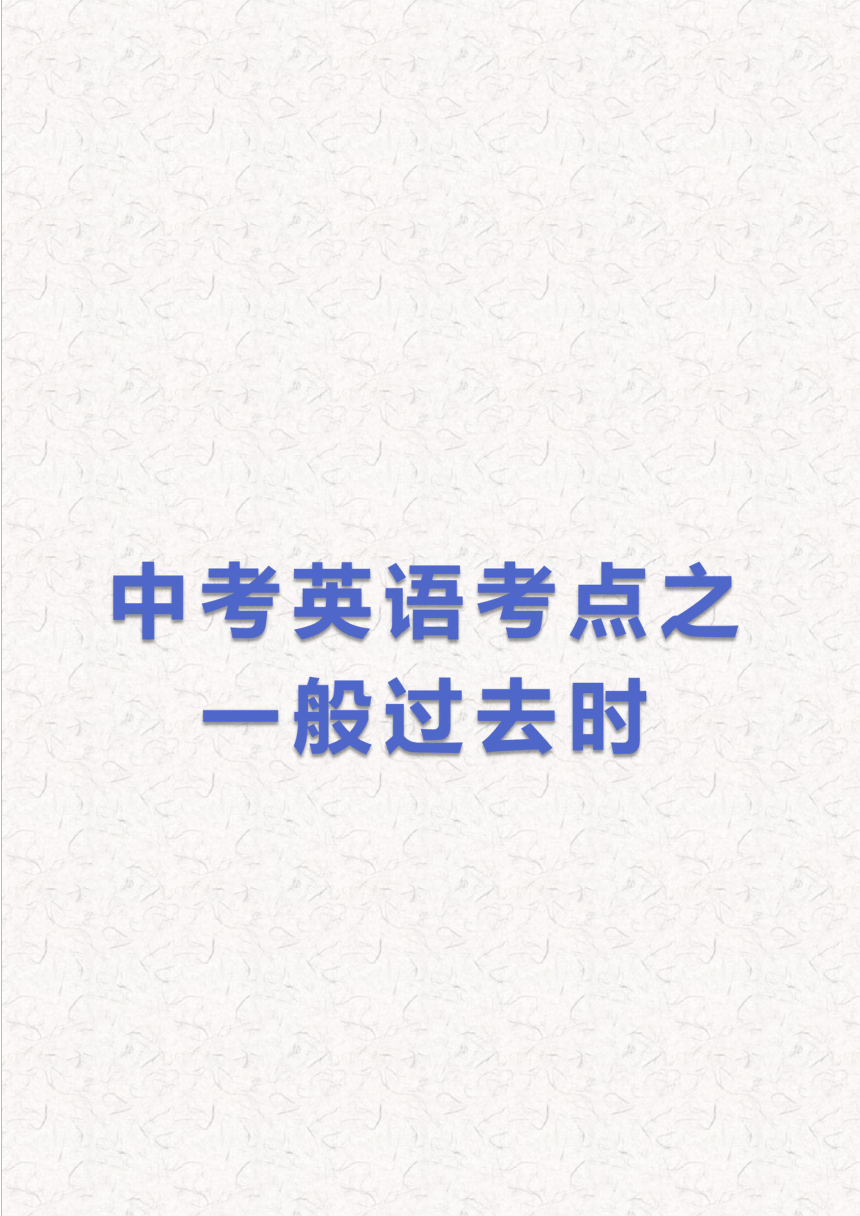
考点十五 一般过去时 1. 一般过去时的定义 ①一般过去时表示过去某个时间发生的动作或存在的状态,常和表示过去的时间状语连用。如 yesterday,the day before yesterday,last week,in 2015,three days ago,the other day,just now,at the moment,this morning,once upon a time,long long ago。 —What did you do yesterday 昨天你做了什么? —I went swimming. 我去游泳了。 ②表示过去经常性或习惯性发生的动作。 When I was at middle school, I often went to school by bike. 我读中学时经常骑自行车去学校。 2. 一般过去时的基本结构 ①实义动词 肯定句:主语 + 动词过去式 + 其他. I went to the cinema yesterday. 我昨天看了电影。 否定句:主语 + didn’t + 动词原形 + 其他。 I didn’t go to the cinema yesterday. 我昨天没看电影。 一般疑问句及其回答:Did + 主语 + 动词原形 + 其他 肯定回答:Yes, 主语 + did. 否定回答:No, 主语 + didn’t / did not. —Did you go to the cinema yesterday 你昨天去看电影了吗? —Yes, I did./No, I didn’t. 是的,我去了。/ 不,我没去。 特殊疑问句:特殊疑问词+did+主语+动词原形+其他? —Where did you go yesterday 你昨天去哪儿了? —I went to the cinema yesterday. 我昨天去看电影了。 ② be 动词 肯定句:主语 + was/were + 其他. I was at home yesterday. 我昨天在家。 否定句:主语 + wasn’t/weren’t + 其他. I wasn’t at home yesterday. 我昨天没在家。 一般疑问句及其回答:Were/Was + 主语 + 其他 —Were you at home yesterday 你昨天在家吗? —Yes, I was. / No, I wasn’t. 是的,我在家。/ 不,我不在家。 特殊疑问句:特殊疑问词 + were/was + 主语 + 其他 —Where were you yesterday 你昨天在哪? —I was at home yesterday. 我昨天在家。 3. 动词过去式的变化规则 情况 构成方法 例词 一般情况 加-ed wash→washed help→helped 以不发音的字母e结尾 加-d hope→hoped like→liked 以辅音字母 + y结尾 变y为i,再加-ed carry→carried study→studied 结尾只有一个辅音字母的重读闭音节 双写末尾的辅音字母,再加-ed stop→stopped plan→planned 4. 一般过去时的用法 (1)表示在过去某个时间所发生的动作或所处的状态。常与yesterday, last week, in 1989, just now, a moment ago, the other day等连用。 He was here just now. 他刚才还在这里。 What did you do yesterday 你昨天做了什么事 (2)在过去一段时间内的经常性或习惯性动作。 We often played together when we were children. 我们小时候常在一起玩。 注意:表示过去经常发生的动作还可用used to和would。 He used to smoke a lot, but he doesn’t now. 他过去经常抽烟,但现在不抽了。 Whenever we were in trouble, he would help us. 每当我们遇到困难,他都会帮助我们。 (3)表示主语过去的特征或性格。 At that time she was very good at English. 那时她英语学得很好。 (4)用在状语从句中表示过去将来。 He said he would wait until they came back. (5)一般过去时有时可以表示现在,多与 want, hope, wonder, think, intend 等动词连用,使语气更委婉。 I wondered if you could help me. 不知你能不能帮我一下。 有时用一般过去时也是时态一致的需要。 I didn’t know you were here. 我不知道你在这里。 注意: (1)表示一系列的动作,尽管有先后,都用一般过去时,最后两个动词之间用and连结。 He opened the door, rushed out and then disappeared. 他打开门,冲了出去,然后就消失了。 (2)注意在语境中理解"我刚才/原来还不… ... ...
~~ 您好,已阅读到文档的结尾了 ~~

